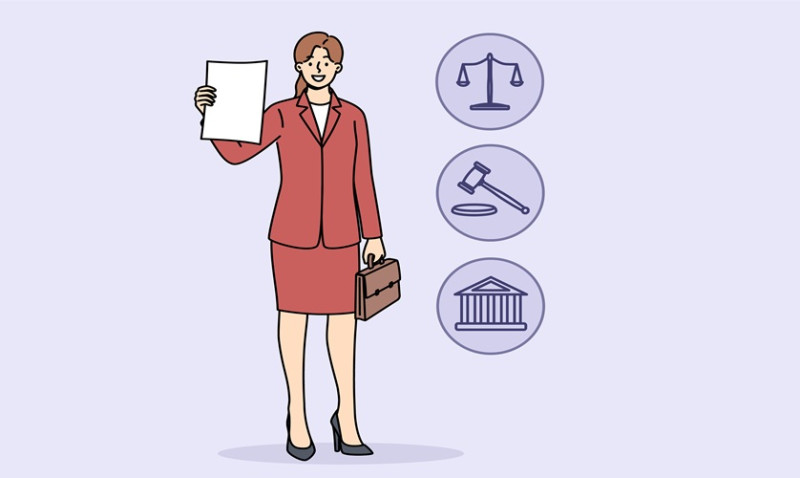
Legal professionals are vital in almost every walk of life — from buying a new property, defending your rights, starting a business, or planning your estate. But not all lawyers are the same. Just as tradespeople specialise in different areas — from electricians to plumbers to decorators — so too do lawyers. In this blog post, we’ll explore the different types of lawyers available in the United Kingdom, what they do, and in which situations you might need to consult or hire one.
Whether you're a DIY enthusiast refurbishing your first home, a professional designer navigating complex contracts, or a self-employed tradesman dealing with local regulations, knowing the right type of legal expert to consult can save you significant time, stress, and money.
1. Property Lawyers (Conveyancing Solicitors)
If you're buying, selling, or leasing property — whether it's a flat in Manchester or a fixer-upper in rural Cornwall — you'll likely be dealing with property lawyers. These solicitors specialise in conveyancing, which is the legal term for the transfer of property from one person to another.
Property lawyers handle all legal documentation such as contracts, conduct local authority searches, and ensure that any mortgage or financing is properly structured. They're crucial for making sure that everything is above board, helping buyers avoid scams or legal issues down the road.
Many young professionals purchasing their first homes may not realise how important a good conveyancing solicitor is. A knowledgeable property lawyer will explain terms, raise concerns, and keep the process moving efficiently — making what can be a daunting experience much smoother.
If you’re a property developer or an architect involved in planning permission and land use changes, a property solicitor with specialisation in commercial and planning law can be invaluable.
2. Contract and Commercial Lawyers
Anyone who deals with contracts regularly — such as tradesmen, architects, or interior designers — should be familiar with commercial lawyers. They focus on the laws surrounding business dealings and are experts at drafting, reviewing, and negotiating contracts.
If you’re starting a business, hiring subcontractors, or working on a large construction or design project, these legal professionals ensure your contracts are fair, compliant with UK law, and enforceable.
Commercial lawyers can also assist with disputes, including unpaid invoices or disagreements over project scope and deliverables. With their help, you can avoid small issues turning into expensive problems.
They can advise on liability clauses, intellectual property rights (especially useful for designers), terms of business, and more. For professionals in creative and construction industries, commercial lawyers are an essential part of running a secure and successful enterprise.
3. Construction Lawyers
Specialist construction lawyers deal with the legal aspects of buildings and infrastructure projects. They are particularly useful for architects, design firms, and tradespeople engaged in large-scale renovations or developments.
They cover areas such as construction contracts (like JCT contracts), disputes between contractors, project delay claims, health and safety law, and building regulation compliance.
Construction law can be highly complex and is often governed by layers of codes, standards, and specific contract types. Whether you're working with a developer or taking on a big domestic extension project, a construction lawyer can help everything go smoothly and legally.
Common issues these lawyers help resolve include defective works, non-payment, delays, and liability for construction defects after completion. Having one on your team when things get complicated can help resolve disputes before they escalate to costly litigation.
4. Employment Lawyers
If you're an employer — even if it's just hiring one apprentice or assistant — then you have legal responsibilities. Employment lawyers specialise in the relationship between employers and workers, advising both individuals and businesses on their rights and obligations.
These legal professionals can assist with everything from drafting employment contracts that meet current regulations to handling dismissals and redundancy processes properly. For tradesmen growing their teams or designers launching a firm, employment solicitors ensure you're protected and compliant.
Employees can consult them over issues like unfair dismissal, workplace discrimination, or contract breaches. Their expertise also extends to workplace health and safety regulations, especially relevant to those in labour-intensive environments like construction.
5. Intellectual Property (IP) Lawyers
Creative professionals — such as interior designers, product designers, and architects — often produce designs or original content that they’ll want to protect. That’s where IP lawyers come into play.
These legal experts specialise in protecting creations like designs, logos, product models, software and even bespoke interiors. They deal with copyright, trademarks, design rights, and patents.
Imagine you’ve designed a one-of-a-kind kitchen layout for a client. An IP lawyer can help ensure your work isn’t copied by a competitor. Similarly, they can assist in legally enforcing infringement in court or via cease-and-desist notices.
Startups and freelancers can also use these lawyers when branding their businesses — ensuring no one else can legally use your chosen business name, logo, or slogan.
6. Planning and Environmental Lawyers
Planning permission and land use regulations can be a headache for anyone involved in renovation or construction. Planning lawyers are experts in local authority planning law, building use classifications, development rights, and appeals.
If you're an architect designing in a conservation area or a homeowner seeking to push the boundaries of what's allowed, these legal professionals clarify what’s possible and help obtain necessary permits. They assist in navigating complex planning paperwork and responding to planning objections.
Environmental lawyers, a closely related speciality, help with cases involving landscaping, protected green zones, sustainability regulations, and pollution prevention. These are crucial in commercial projects with environmental impact assessments or eco-conscious developments.
A lawyer well-versed in planning and environmental law can be invaluable for professional property developers and homeowners alike, particularly in ensuring developments are permissible and sustainable from a legal standpoint.
7. Dispute Resolution and Litigation Lawyers
Sometimes, despite the best intentions and contracts in place, things go wrong. You may face unpaid invoices, defective work, or disagreements over the fulfilment of a project. When this happens and you can't resolve it informally, a dispute resolution or litigation lawyer can step in.
They specialise in managing formal legal disputes, whether through negotiation, mediation, adjudication, or court hearings. Litigation lawyers can represent you in county court or the High Court, and they ensure your rights are protected while seeking the best possible outcome.
Common scenarios include customer disputes over work quality, withheld payments, property boundary disagreements, and breach of contract claims. Tradesmen and designers dealing with difficult clients often benefit from quick legal guidance to avoid escalation.
Many dispute resolution lawyers will try to settle matters without going to court, saving everyone additional legal costs and time.
8. Wills & Probate Lawyers
While it may not immediately link to home development or trade work, having your personal affairs in order is important — especially if you run your own business or own property. Wills and probate lawyers help people write legal wills and manage estates after a death.
They ensure that your assets — homes, savings, business tools, intellectual property — go where you choose, with minimal tax liability and delays. For those with families or significant assets, a properly structured will is essential.
These lawyers also support families with inheritance issues, disputed wills, and appointing legal guardians for children. If you're a sole trader or own a property with others, having a will in place ensures a smooth transition of your estate.
Quick Reference Table of Legal Specialists
| Type of Lawyer | Core Services | Ideal For |
|---|---|---|
| Property Lawyers | Conveyancing, mortgage handling, lease agreements | Homebuyers, landlords, developers |
| Commercial Lawyers | Contracts, business setup, disputes | Designers, tradesmen, small businesses |
| Construction Lawyers | Project disputes, contract issues, compliance | Architects, contractors, builders |
| Employment Lawyers | Work contracts, dismissals, employee rights | Employers, staff, freelancers |
| IP Lawyers | Trademarks, copyright, design protection | Designers, creatives, innovators |
| Planning Lawyers | Planning permissions, appeals, land use | Homeowners, developers, architects |
| Litigation Lawyers | Disputes, court cases, mediator services | Anyone facing legal disagreements |
| Wills & Probate Lawyers | Estate planning, wills, inheritance issues | Property owners, families, business owners |
Final Thoughts
Understanding the types of lawyers available — and when to use them — can help you make smart decisions whether you're launching a new project, hiring talent, protecting your designs, or buying a property. For professionals in hands-on industries like design, construction, and DIY, the right legal support makes all the difference between a smooth operation and a costly misstep.
If you’re unsure which lawyer type you need, it’s best to speak with a general solicitor who can guide you or refer you to a more specialised practice. Think of them as your legal project manager — helping you stay protected and compliant every step of the way.





